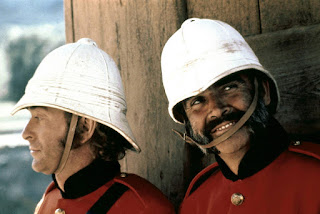Saturday, 7 May 2016
Movie Review: The Man Who Would Be King (1975)
An epic adventure story, The Man Who Would Be King is a romp through British-ruled southeastern Asia with two rogues seeking to define their destiny.
It's 1885, and a bedraggled Peachy Carnehan (Michael Caine) visits the office of author and newspaperman Rudyard Kipling (Christopher Plummer) in India. The rest of the story is told in one long flashback. Peachy, a retired infantryman in the British army, met Kipling three years prior, with Peachy stealing Kipling's pocket watch but conspiring to return it when he realized that Kipling was a fellow Freemason. With Kipling's help Peachy reconnects with his old army buddy Daniel Dravot (Sean Connery), and together the two former soldiers set off on an unlikely adventure to the nether reaches of the British Empire.
Packing a cache of rifles, the pair travel to the remote and backward territory of Kafiristan (in modern day Afghanistan) where foreigners are not welcome but where Peachy and Daniel anyway hope to become kings. They traverse harsh terrain, survive unforgiving weather, and after connecting with fellow ex-soldier Billy Fish (Saeed Jaffrey), use their military training to help a local warlord. Soon the two Brits are leading a large army across the land with a combination of strategy, audacity and hogwash. When news of their military exploits spreads, the locals start to believe that Daniel is a long-promised returning conqueror, and the seemingly ridiculous goal of attaining a kingdom suddenly seems real.
Perhaps the last truly great film from legendary director John Huston, The Man Who Would Be King winds back the years and delivers an old-fashioned adventure story for the ages. Based on a Kipling novella, the movie is an engrossing two hours driven by two memorable characters with nothing to lose, who set their sights on a remarkable prize and find a way to actually get within reach of the impossible.
The film is a visual feast courtesy of magnificent Oswald Morris cinematography and an evocative recreation of India and neighbouring untamed territories of the late 1800s. The prevailing aesthetics are the yellows and browns of a hot dusty desert protected by impossible mountain passes, where civilization lags, locals wage wars for centuries and outsiders are summarily dealt with.
But at the heart of the grand spectacle is a story of two men, and the film works because despite the bazaars, the battles and the bastions, Huston (who co-wrote the script with Gladys Hill) keeps the focus on his two main characters. Peachy and Daniel carry the British Imperial attitude of subjugate with charm or die trying, married to an indefatigable belief in their ability to get out of trouble by fair means or foul as needed. They are rascals on the loose with unexplored terrain as their playground, and their dream big philosophy is infectious.
The story explores themes of absolute power corrupting absolutely, and hubris as a force even more powerful than adventurism. When Peachy and Daniel do come face to face with their destiny, it is more intoxicating than they ever believed possible. What could have been a get-rich-quick opportunity instead becomes the fulfillment of ancient mythology in a world awaiting saviors. Two quick thinking British soldiers can get out of many jams, but resisting the intoxicating sensation of being worshipped is an altogether different challenge.
Michael Caine and Sean Connery make for an appealing pair, Caine as Peachy more scrappy and cerebral, Connery as Daniel perhaps not as sharp but capable of conveying impressive gravitas. The two carry the movie with ease, sharing exploits and prodding each other on when the going gets tough, which is often.
The Man Who Would Be King is filmmaking at its most expansive, an unconstrained scope unfolding in parallel with the unlimited ambition of two tenacious adventurers.
All Ace Black Blog Movie Reviews are here.
Labels:
Christopher Plummer,
Michael Caine,
Sean Connery
Subscribe to:
Post Comments (Atom)





No comments:
Post a Comment
We welcome reader comments about this post.